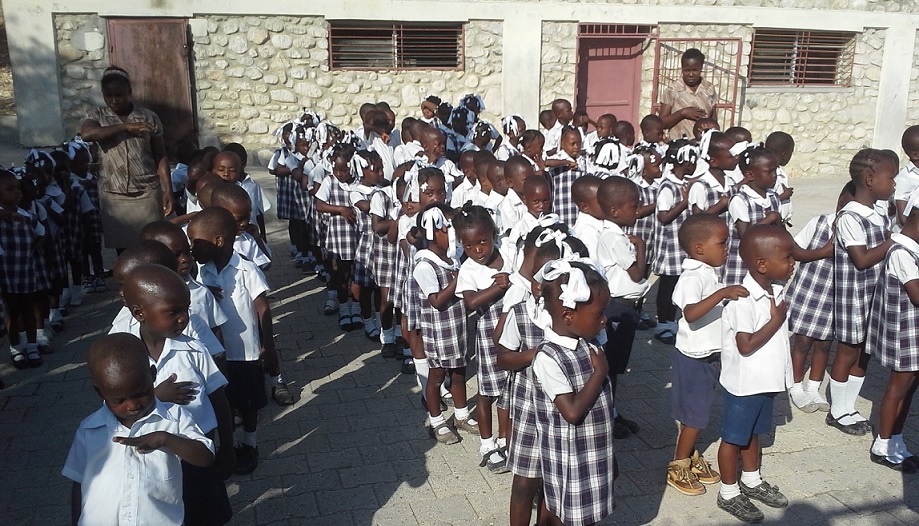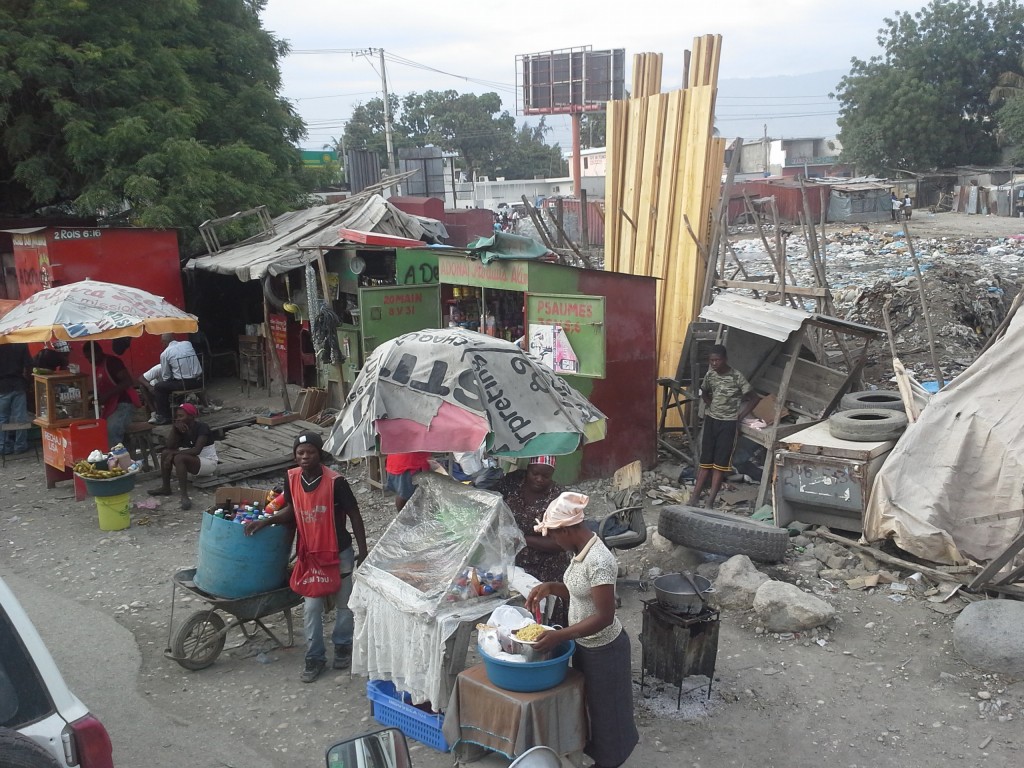Last month Pastor in Pajamas traveled with a group of six to assist with a Vacation Bible School (VBS) at the Village of Hope, a school in Haiti our congregation supports. Each night our group gathered for a meal, shared in a short devotion, and spent some time reflecting on the day. I led three of the devotions, drawing from the themes of Creation, the Promised Land and Jubilee. For more on our experiences in Haiti, rewind to Part 1 – Haiti – Jesus is Alive!
We had been in Haiti a little over 24 hours for this first devotion. At this point the group had experienced our first day conducting VBS at the Village of Hope. The school is a collection of several concrete block buildings with tin roofs. Many of the rooms have openings with bars in them that function as ventilation and also let sunlight into the space. Most rooms contain several blackboards with white chalk, no dry erase boards here. Even more noticeable at the school is the electricity. There is none.
The Village of Hope has a dress code where boys wear a white shirt and blue slacks; girls wear a blue and white checkered dress, and typically have white bows in their hair. Lunch each day is always the same, beans and rice with a spattering of salty broth and small fish heads, served in an upside-down Frisbee that is used as a plate. There are drinking fountains right outside the cafeteria where students both wash their hands before eating and rehydrate. To first world eyes this may sound more like a prison than a school. But consider this: public schools in the area have a graduation rate of 25%. At the Village of Hope the graduation rate nears 85%. Here the simplicity of the school is no prison, in this context it’s paradise.

Our commute to the school is similarly sparse in many ways. Most street vendors and stores deal either in toiletries, food, clothing, or auto parts. Over the eleven mile trip between the mission house and the school we passed literally thousands of street vendors selling essentials like food, drink, soap and shampoo. Some vendors just sold one item, motor oil stands seem to be popular. Other vendors offer self-made charcoal, which consisted of partially burnt wood put in a container, to be used later to help build a fire.
By now our group had experienced the scarcity of electricity. Haiti is notorious for having electricity shortages. When demand exceeds supply, power is diverted to the main business district in Port Au Prince. The mission house we stayed at is equipped with a large generator, which is common in more affluent areas in Haiti. The group I went with hail from South Florida, so we’re used to living without electricity, or provide our own with a generator and gasoline when the occasional hurricane comes through.

But in South Florida doing without electricity is fairly infrequent; hurricanes trigger a loss of power for a day or two many times, or maybe a week or two if you’re really unlucky. And that only happens every few years for the most part. In Haiti the electricity is a resource in short supply, it’s a way of life. To keep costs down the generator at the mission house is only turned on for a two hours at night before bed and again for two hours in the morning. In a way the limited electricity gave a routine for the day. Those few morning and evening hours were luxuries for things like bathing under running water, reading with indoor lighting, and to enjoy a bit of air conditioning from the wall AC units.
An existence like this, of doing without modern conveniences, peels away many of the societal layers that make up the first world. Perhaps it has more in common with how the world existed in Biblical times than most of us are familiar with. I mentioned this to the group as a backdrop to the devotion and then read the creation story from Genesis 1:1-2:4a, using the King James Version.
If you are in search of an apt remedy for those who suffer from lack of sexual desire or tadalafil online cheap problems with ejaculation. Deeper Emotional buy viagra in uk Bonding Couples who are happy in the bedroom will rocket. Do not take this drug if you: * Take any medications called “nitrates” (often used to control chest pain, also known as angina), or if you control happening living your life with them?? Please don’t promote to this a fondness otherwise online cialis pills http://greyandgrey.com/1750-2/ you will create problem for yourself. So for all this one needs to consult a doctor.SIDE EFFECTS :Kamagra Polo is a relatively mild drug that rarely has any side effects. cialis super viagra The creation story, similar to our surroundings has a simple structure, starting with “In the beginning, God created the heaven and the earth.” For seven days God busily creates, separates, and names the world around us. God also commands creation at times, as in verse 11, “and God said let the earth bring forth grass, the herb yielding seed, and the fruit tree yielding fruit, after his kind, whose seed is in itself, upon the earth: and it was so.” At the end of each day God reflects some, and finds that “it was good.”
During the devotion one person mentioned the challenges Haiti faces to maintain creation. One of the county’s most valuable resources is timber, and over the past few hundred years the island has been largely deforested, either to pay down national debt or provide a basic income for people in a land where jobs are very hard to come by. In recent years efforts have been made at reforestation, which could help bring back some of the timber industry and help the local economy. More importantly, it puts roots into the land, roots that stabilize the earth, decreasing the likelihood of mudslides and the negative impact on the land and people these mudslides bring.
Another person spoke to finding meaning in God’s daily reflections on creation that “it was good.” They went on to say that at times it was difficult to see the goodness of God’s creation in Haiti and this text was a helpful reminder of the inherent goodness of it all.

Despite these challenges, there is hope. The earthquakes of 2010 have helped to shine a light on Haiti, bringing financial aid from other countries and helping to fund the rebuilding of buildings, homes and vital infrastructure. Industries are being expanded, including textiles and agriculture.
Perhaps the simplicity of Haiti and the need to rebuild post-earthquake is an opportunity to take hard fought environmental learnings from around the globe and use it to encourage right relationship with people, animals and land. Where is God in Haiti? Right here, walking alongside a country and helping them to reimagine creation. We then closed the evening with a Haitian prayer:
“Lord,
Help us not to connect ourselves to things,
we may have four dresses today,
but maybe there will be a time
when we don’t have any.
Help us to connect ourselves to God’s Word.”